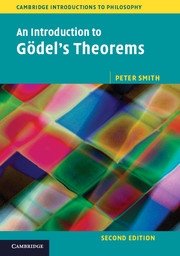Book contents
- Frontmatter
- Contents
- Preface
- Thanks
- 1 What Gödel's Theorems say
- 2 Functions and enumerations
- 3 Effective computability
- 4 Effectively axiomatized theories
- 5 Capturing numerical properties
- 6 The truths of arithmetic
- 7 Sufficiently strong arithmetics
- 8 Interlude: Taking stock
- 9 Induction
- 10 Two formalized arithmetics
- 11 What Q can prove
- 12 IΔ0, an arithmetic with induction
- 13 First-order Peano Arithmetic
- 14 Primitive recursive functions
- 15 LA can express every p.r. function
- 16 Capturing functions
- 17 Q is p.r. adequate
- 18 Interlude: A very little about Principia
- 19 The arithmetization of syntax
- 20 Arithmetization in more detail
- 21 PA is incomplete
- 22 Gödel's First Theorem
- 23 Interlude: About the First Theorem
- 24 The Diagonalization Lemma
- 25 Rosser's proof
- 26 Broadening the scope
- 27 Tarski's Theorem
- 28 Speed-up
- 29 Second-order arithmetics
- 30 Interlude: Incompleteness and Isaacson's Thesis
- 31 Gödel's Second Theorem for PA
- 32 On the ‘unprovability of consistency’
- 33 Generalizing the Second Theorem
- 34 Löb's Theorem and other matters
- 35 Deriving the derivability conditions
- 36 ‘The best and most general version’
- 37 Interlude: The Second Theorem, Hilbert, minds and machines
- 38 μ-Recursive functions
- 39 Q is recursively adequate
- 40 Undecidability and incompleteness
- 41 Turing machines
- 42 Turing machines and recursiveness
- 43 Halting and incompleteness
- 44 The Church–Turing Thesis
- 45 Proving the Thesis?
- 46 Looking back
- Further reading
- Bibliography
- Index
13 - First-order Peano Arithmetic
- Frontmatter
- Contents
- Preface
- Thanks
- 1 What Gödel's Theorems say
- 2 Functions and enumerations
- 3 Effective computability
- 4 Effectively axiomatized theories
- 5 Capturing numerical properties
- 6 The truths of arithmetic
- 7 Sufficiently strong arithmetics
- 8 Interlude: Taking stock
- 9 Induction
- 10 Two formalized arithmetics
- 11 What Q can prove
- 12 IΔ0, an arithmetic with induction
- 13 First-order Peano Arithmetic
- 14 Primitive recursive functions
- 15 LA can express every p.r. function
- 16 Capturing functions
- 17 Q is p.r. adequate
- 18 Interlude: A very little about Principia
- 19 The arithmetization of syntax
- 20 Arithmetization in more detail
- 21 PA is incomplete
- 22 Gödel's First Theorem
- 23 Interlude: About the First Theorem
- 24 The Diagonalization Lemma
- 25 Rosser's proof
- 26 Broadening the scope
- 27 Tarski's Theorem
- 28 Speed-up
- 29 Second-order arithmetics
- 30 Interlude: Incompleteness and Isaacson's Thesis
- 31 Gödel's Second Theorem for PA
- 32 On the ‘unprovability of consistency’
- 33 Generalizing the Second Theorem
- 34 Löb's Theorem and other matters
- 35 Deriving the derivability conditions
- 36 ‘The best and most general version’
- 37 Interlude: The Second Theorem, Hilbert, minds and machines
- 38 μ-Recursive functions
- 39 Q is recursively adequate
- 40 Undecidability and incompleteness
- 41 Turing machines
- 42 Turing machines and recursiveness
- 43 Halting and incompleteness
- 44 The Church–Turing Thesis
- 45 Proving the Thesis?
- 46 Looking back
- Further reading
- Bibliography
- Index
Summary
In the last chapter, we considered the theory IΔ0 built in the language LA, whose axioms are those of Q, plus (the universal closures of) all instances of the Induction Schema for Δ0 predicates. Now we lift that restriction on induction, and allow any LA predicate to appear in instances of the Schema. The result is (first-order) Peano Arithmetic.
Being generous with induction
(a) Given what we said in Section 9.1(a) about the motivation for the induction principle, any instance of the Induction Schema will be intuitively acceptable as an axiom, so long as we replace φ in the Schema by a suitable open wff which expresses a genuine property/relation.
We argued at the beginning of the last chapter that Δ0 wffs are eminently suitable, and we considered the theory you get by adding to Q the instances of the Induction Schema involving such wffs. But why should we be so very restrictive?
Take any open wff φ of LA at all. This will be built from no more than the constant term ‘0’, the familiar successor, addition and multiplication functions, plus identity and other logical apparatus. Therefore – you might very well suppose – it ought also to express a perfectly determinate arithmetical property or relation. So why not be generous and allow any open LA wff to be substituted for φ in the Induction Schema? The result of adding to Q (the universal closures of) every instance of the Schema is PA – First-order Peano Arithmetic.
(b) …
- Type
- Chapter
- Information
- An Introduction to Gödel's Theorems , pp. 90 - 96Publisher: Cambridge University PressPrint publication year: 2013

